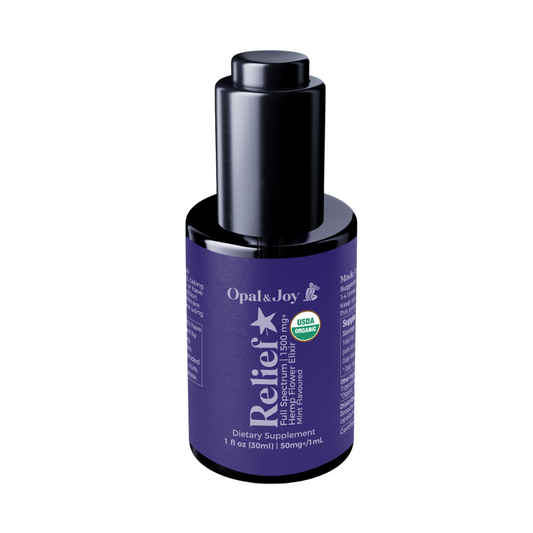
Dr. Heather Hirsch Debunks 5 Perimenopause Myths
If you’ve ever felt confused, dismissed, or downright blindsided by the changes happening in your body during perimenopause, know that you're not alone. Millions of women are derailed every year by symptoms caused by the decline of their sex hormones.
Yet, despite how common it is, misinformation still runs wild, leaving many of us second-guessing what’s normal and what’s not. And that’s exactly why debunking perimenopause myths matters.
Debunking Perimenopause Myths
Leading menopause specialist and author of The Perimenopause Survival Guide and Unlock Your Menopause Type, Dr. Heather Hirsch, MD, recently wrote an article for Oprah Daily, "5 Facts About Perimenopause That Will Put Your Mind at Ease," that debunks five of the most common myths about menopause and perimenopause.
According to Dr Hirsch, the medical system has “understudied perimenopause for decades, leaving women vulnerable to myths and misinformation.”
So, let’s set the record straight. Here are five perimenopause myths Dr. Hirsch wants every woman to stop believing and what’s actually true.

Meno Myth 1: If I still get my period, I can’t be perimenopausal
Dr. Hirsch calls this idea “blatantly false.” Perimenopause can last one to ten years, and during much of that time, you may still have cycles, though often irregular.
“There are multiple years when you are still bleeding and having symptoms of either low estrogen, progesterone, or testosterone," says Dr. Hirsch. "In fact, one of the earliest signs of perimenopause is that your periods become irregular.”
So if your cycle suddenly changes — heavier, lighter, shorter, longer — it might not be stress. It could be the start of perimenopause. Tracking symptoms such as anxiety, night sweats, or mood dips alongside your period patterns can help you and your clinician identify what’s happening hormonally.

Meno Myth 2: It’s “too early” for hormone therapy if you’re in your 40s
Many women hear they can’t consider hormone therapy until after their final period. Dr. Hirsch counters, saying, “There is no rule that says you must be in menopause before you start hormone therapy. The main reason to consider it is your symptoms.”
Perimenopause can stretch up to a decade and that’s a long time to suffer unnecessarily. Starting hormone therapy earlier can not only ease hot flashes, anxiety, and insomnia but may also have diagnostic and preventive benefits.
“If a symptom resolves after you try hormone therapy, whether it’s mood, a frozen shoulder, or insomnia, you can feel more confident it’s hormone-related,” says Dr. Hirsch.
Emerging data suggest women who begin hormone therapy earlier may also see reduced risks of heart disease, bone loss, and cognitive decline.

Meno Myth 3: You can’t get pregnant in perimenopause
This myth can lead to some real surprises. “Even though your periods may be highly irregular — or you may not even be getting periods — you could still ovulate,” says Dr. Hirsch.
Until you’ve gone 12 consecutive months without a period, pregnancy is still possible. She reminds patients that “hormone therapy is not birth control,” meaning it won’t prevent pregnancy.
If you’re sexually active and don’t wish to conceive, continue contraception; if you’re hoping to conceive, know that perimenopause doesn’t always mean fertility has ended.

Meno Myth 4: If I can’t sleep, it’s just stress or high cortisol
Perimenopausal insomnia isn’t just about modern life stress and hormones play a starring role, says Dr. Hirsch.
“As estrogen declines, it’s common for cortisol levels to creep up. But most of the advice about cortisol doesn’t connect the dots between stress hormones and reproductive hormones.”
Focusing only on lowering cortisol misses the root cause. Declining estrogen and progesterone disrupt body temperature, mood, and circadian rhythm and is the real reason so many women wake up at 3 am drenched in sweat or wide awake.
Supporting hormonal balance, whether through medical therapy, adaptogenic supplements, or lifestyle changes, is key to restoring deep, consistent sleep, which is the foundation for feeling human again.

Myth 5: There’s a test for perimenopause
Many women wish for a simple blood test that confirms, “Yes, you’re perimenopausal.” But as Dr. Hirsch says plainly, “Perimenopause is a clinical diagnosis.”
"I can’t tell you how often I hear a woman say, 'I went to my doctor, they checked my labs, and said they’re all normal.” But lab tests that check your hormone levels—typically estrogen, FSH, and maybe testosterone—capture only what’s happening on that one day, while your hormones are continually in flux throughout the month. No lab test can rule in or rule out perimenopause on its own. So, to be told you’re not in perimenopause (or that you’re in menopause), based on a lab test on its own, can be misleading as well as invalidating of your experience."
Because hormone levels fluctuate day to day, a single lab result can’t capture the whole picture. "Your symptoms, age, and menstrual history tell the real story," says Dr. Hirsch.
This means your lived experience matters. Trust what your body is telling you. Keep a symptom journal, and work with a clinician trained in menopause care who listens to your patterns, not just your labs.
The Perimenopause Myth Takeaway
Perimenopause is a powerful hormonal transition that deserves understanding and care, not a mystery or a malfunction.
At Opal & Joy, we’ve made it our mission to help women move through perimenopause feeling balanced, calm, and well-rested. Our Restorative Sleep System is designed to complement this journey, supporting hormone harmony, easing anxiety and helping you get the deep, restorative sleep you need without grogginess.
Ready to take control of your nights? Shop our Restorative Sleep System.



